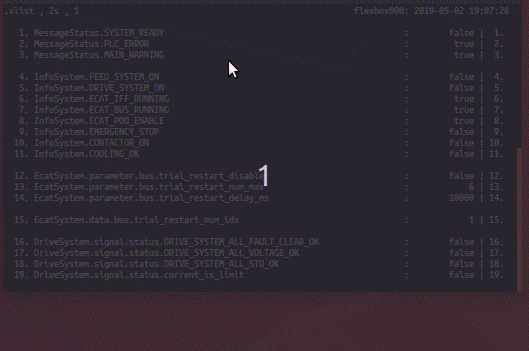He creado un programa bash ** swatch ** que hace exactamente lo que quieres en bash. En el video gif, puede ver cómo desplazarse por un archivo mmio cambiante.

#!/bin/bash
#
# watch a file and scroll
#
# keys => arrow-up/down, page-up/down, pos1, end
#
# usages:
# swatch -n <timeout_watch> <file>
# swatch <file>
#
# version: 1.1
# dependencies: awk , tput , clear, read
# published: https://unix.stackexchange.com/questions/3842/how-can-i-scroll-within-the-output-of-my-watch-command
# gif recording: peek , https://github.com/phw/peek
#
# =============================================
# KEYCODES
# =============================================
# https://unix.stackexchange.com/questions/294908/read-special-keys-in-bash
# showkey -a
# =============================================
# DEFAULTS
# =============================================
fname=""
line_show_begin=1
line_show_begin_last=-1
console_lines_correction=4
timeout_watch=2
timeout_read=.1
# =============================================
# DEFINE Escape-Sequences
# =============================================
# http://ascii-table.com/ansi-escape-sequences-vt-100.php
ESC_clr_line='\033[K'
ESC_reset_screen='\033c'
ESC_clr_screen='\033[2J'
ESC_cursor_pos='\033[0;0f'
ESC_cursor_home='\033[H'
# =============================================
# FUNCTIONS
# =============================================
function fn_help() {
cat << EOF
Usage: ./$0 [-n <timeout>] [<file>] , timeout >0.1s , default 2s
EOF
}
function get_options() {
[[ "$1" == "" ]] && { fn_help ; exit 1 ; }
while [ -n "$1" ]; do
case "$1" in
-h|--help)
fn_help
;;
-n)
[[ "$2" == "" ]] && { echo "Error: option -n required <timeout>" ; exit 1 ; }
if [[ "$(echo "$2<0.1"|bc)" == "0" ]] ; then
timeout_watch="$2"
shift
else
echo "Error: timeout <0.1 not allowed"
exit 1
fi
;;
-*)
echo "Error: unknown option »$1«"
exit 1
;;
*)
if [[ -f "$1" ]] ; then
fname=$1
else
echo "Error: file not found »$1«"
exit 1
fi
;;
esac
shift
done
[[ "$fname" == "" ]] && { echo "Error: file required" ; exit 1 ; }
}
function fn_print_headline() {
hdl_txt_right="${HOSTNAME}: $(date "+%Y-%m-%d %H:%M:%S")"
hdl_txt_left="$fname , ${timeout_watch}s , $line_show_begin"
hdl_txt_left_length=${#hdl_txt_left}
printf '%s%*s\n\n' "$hdl_txt_left" "$(($console_columns-$hdl_txt_left_length))" "$hdl_txt_right"
}
function fn_print_file() {
# ---------------------------------------------------
# file lenght can change while watch
# ---------------------------------------------------
lines_fname=$(awk 'END {print NR}' $fname)
line_last=$(($lines_fname-$console_lines))
(( "$line_last" < "1" )) && { line_last=1; clear; }
(( "$line_show_begin" > "$line_last" )) && { line_show_begin=$line_last; clear; }
# ---------------------------------------------------
# print postion changed
# ---------------------------------------------------
if (( "$line_show_begin" != "$line_show_begin_last" )) ; then
line_show_begin_last=$line_show_begin;
clear
else
printf $ESC_cursor_home
fi
# ---------------------------------------------------
# print file section
# ---------------------------------------------------
fn_print_headline
awk -v var1="$line_show_begin" -v var2="$console_lines" 'NR>=var1 {if (NR>var1+var2) {exit 0} else {printf "%s\n",$0 } }' $fname
}
function fn_console_size_change() {
console_columns=$(tput cols)
console_lines=$(($(tput lines)-$console_lines_correction))
line_show_begin_last=-1
}
function fn_quit() {
echo "quit" $0 , $?
setterm -cursor on ; exit 0
}
# =============================================
# GET OPTIONS
# =============================================
get_options "$@" # pass all arguments with double-quotes
# =============================================
# INIT TRAP
# =============================================
trap "fn_console_size_change" SIGWINCH # https://en.wikipedia.org/wiki/Signal_(IPC)#SIGWINCH
trap "fn_quit" INT TERM EXIT
# =============================================
# MAIN
# =============================================
fn_console_size_change
setterm -cursor off
while true ; do
fn_print_file
read -rsn1 -t $timeout_watch k # char 1
case "$k" in
[[:graph:]])
# Normal input handling
;;
$'\x09') # TAB
# Routine for selecting current item
;;
$'\x7f') # Back-Space
# Routine for back-space
;;
$'\x01') # Ctrl+A
# Routine for ctrl+a
;;
$'\x1b') # ESC
read -rsn1 k # char 2
[[ "$k" == "" ]] && return Esc-Key
[[ "$k" == "[" ]] && read -rsn1 -t $timeout_read k # char 3
[[ "$k" == "O" ]] && read -rsn1 -t $timeout_read k # char 3
case "$k" in
A) # Arrow-Up-Key
(( "$line_show_begin" > "1" )) && line_show_begin=$(($line_show_begin-1))
;;
B) # Arrow-Down-Key
(( "$line_show_begin" < "$line_last" )) && line_show_begin=$(($line_show_begin+1))
;;
H) # Pos1-Key
line_show_begin=1
;;
F) # End-Key
line_show_begin=$line_last
;;
5) # PgUp-Key
read -rsn1 -t $timeout_read k # char 4
if [[ "$k" == "~" ]] && (( "$line_show_begin" > "$(($console_lines/2))" )) ; then
line_show_begin=$(($line_show_begin-$console_lines/2))
else
line_show_begin=1
fi
;;
6) # PgDown-Key
read -rsn1 -t $timeout_read k # char 4
if [[ "$k" == "~" ]] && (( "$line_show_begin" < "$(($line_last-$console_lines/2))" )) ; then
line_show_begin=$(($line_show_begin+$console_lines/2))
else
line_show_begin=$line_last
fi
;;
esac
read -rsn4 -t $timeout_read # Try to flush out other sequences ...
;;
esac
done

screencomando conwatch